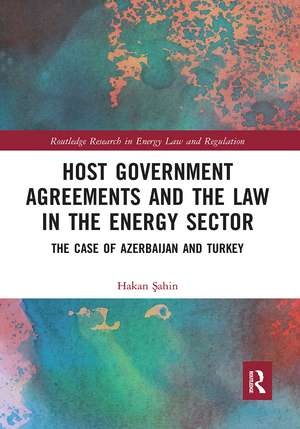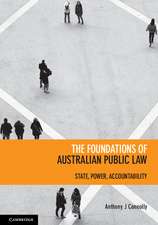Host Government Agreements and the Law in the Energy Sector: The case of Azerbaijan and Turkey: Routledge Research in Energy Law and Regulation
Autor Hakan Sahinen Limba Engleză Paperback – 13 dec 2021
This book identifies the political risks, particularly of indirect expropriation, that arise from the unilateral actions of host governments during the lifespan of energy investment projects. Focusing on stabilisation clauses as a political risk management tool, this research-based study draws on comparative empirical evidence from Turkey and Azerbaijan to determine what influences host states to consent to the insertion of stabilisation clauses in long-term host government agreements. Proposing a framework for the role to be played by both internal forces and external forces, it examines political regimes and state guarantees to foreign investors in Azerbaijan and Turkey from a comparative perspective, assessing how effective internal factors in Azerbaijan and Turkey are in facilitating contractual stability in their energy investment projects.
Providing a comprehensive analysis of stabilisation clauses and the internal and external factors that compel host states to commit to them, this book will appeal to practitioners, students and scholars in international investment law and energy law.
| Toate formatele și edițiile | Preț | Express |
|---|---|---|
| Paperback (1) | 383.50 lei 43-57 zile | |
| Taylor & Francis – 13 dec 2021 | 383.50 lei 43-57 zile | |
| Hardback (1) | 1000.27 lei 43-57 zile | |
| Taylor & Francis – 7 dec 2018 | 1000.27 lei 43-57 zile |
Preț: 383.50 lei
Nou
Puncte Express: 575
Preț estimativ în valută:
73.38€ • 76.82$ • 60.72£
73.38€ • 76.82$ • 60.72£
Carte tipărită la comandă
Livrare economică 07-21 aprilie
Preluare comenzi: 021 569.72.76
Specificații
ISBN-13: 9781032241722
ISBN-10: 1032241721
Pagini: 208
Dimensiuni: 156 x 234 x 11 mm
Greutate: 0.31 kg
Ediția:1
Editura: Taylor & Francis
Colecția Routledge
Seria Routledge Research in Energy Law and Regulation
Locul publicării:Oxford, United Kingdom
ISBN-10: 1032241721
Pagini: 208
Dimensiuni: 156 x 234 x 11 mm
Greutate: 0.31 kg
Ediția:1
Editura: Taylor & Francis
Colecția Routledge
Seria Routledge Research in Energy Law and Regulation
Locul publicării:Oxford, United Kingdom
Public țintă
PostgraduateNotă biografică
Hakan Sahin is an Assistant Professor in Private International Law at Maltepe University, Istanbul. He regularly advises state entities as well as private clients on a range of issues, including international energy law, international arbitration and international investment law.
Cuprins
Acknowledgements
List of abbreviations
PART I
Political risks in the energy sector
1 Introduction and framework of the research
Introduction
Expropriation or nationalisation?
Why are stabilisation clauses a controversial issue?
Host government agreements
Objectives and scope of the research
The gap in conventional literature
Research questions
Methodology
Overview of Azerbaijan and Turkey
Baku–Tbilisi–Ceyhan crude oil pipeline project: timeline, importance and issues
Structure of the book
2 Indirect expropriation
Introduction
Distinguishing between direct and indirect expropriation
The types of host state measures that may constitute indirect expropriation
Criteria for the distinction between legitimate regulation (noncompensable regulation) and indirect expropriation
Sole effect versus police power
Bilateral investment treaties of Azerbaijan and Turkey and their treaty provisions concerning indirect expropriation
Tools for mitigating indirect expropriation risk
Conclusions
PART II
Mitigating political risks through stability provisions
3 Stabilisation clauses
Introduction
General implications of stabilisation clauses
Typologies of stabilisation clauses
Legal importance and functional value of stabilisation clauses
Do stabilisation provisions constitute a threat to environmental protection and human rights?
The BTC pipeline project (I): reactions to the project
Conclusion
4 Lenders, risk insurers and rating agencies
Introduction
The main financial institutions in project financing
The role of lenders in inclusion of stabilisation clauses
Political risk insurance providers
The role of political risk insurance providers in the inclusion of stabilisation clauses
Credit rating agencies
The role of credit rating providers in the inclusion of stabilisation clauses
Baku–Tbilisi–Ceyhan pipeline project (II)
Conclusions
5 Political systems and laws on foreign investment in Azerbaijan and Turkey
Introduction
Azerbaijan
Turkey
A comparison of guarantees available under FDI laws and political regimes in Azerbaijan and Turkey
Conclusions
PART III
Conclusion and recommendations
6 Conclusions and recommendations
The research findings and conclusions
Recommendations
Index
List of abbreviations
PART I
Political risks in the energy sector
1 Introduction and framework of the research
Introduction
Expropriation or nationalisation?
Why are stabilisation clauses a controversial issue?
Host government agreements
Objectives and scope of the research
The gap in conventional literature
Research questions
Methodology
Overview of Azerbaijan and Turkey
Baku–Tbilisi–Ceyhan crude oil pipeline project: timeline, importance and issues
Structure of the book
2 Indirect expropriation
Introduction
Distinguishing between direct and indirect expropriation
The types of host state measures that may constitute indirect expropriation
Criteria for the distinction between legitimate regulation (noncompensable regulation) and indirect expropriation
Sole effect versus police power
Bilateral investment treaties of Azerbaijan and Turkey and their treaty provisions concerning indirect expropriation
Tools for mitigating indirect expropriation risk
Conclusions
PART II
Mitigating political risks through stability provisions
3 Stabilisation clauses
Introduction
General implications of stabilisation clauses
Typologies of stabilisation clauses
Legal importance and functional value of stabilisation clauses
Do stabilisation provisions constitute a threat to environmental protection and human rights?
The BTC pipeline project (I): reactions to the project
Conclusion
4 Lenders, risk insurers and rating agencies
Introduction
The main financial institutions in project financing
The role of lenders in inclusion of stabilisation clauses
Political risk insurance providers
The role of political risk insurance providers in the inclusion of stabilisation clauses
Credit rating agencies
The role of credit rating providers in the inclusion of stabilisation clauses
Baku–Tbilisi–Ceyhan pipeline project (II)
Conclusions
5 Political systems and laws on foreign investment in Azerbaijan and Turkey
Introduction
Azerbaijan
Turkey
A comparison of guarantees available under FDI laws and political regimes in Azerbaijan and Turkey
Conclusions
PART III
Conclusion and recommendations
6 Conclusions and recommendations
The research findings and conclusions
Recommendations
Index
Descriere
This book which determines the political risks that arise from unilateral actions of host governments during the life span of the energy investment projects. Focusing on stabilisation clauses as a political risk manager, it examines what influences host states to agree stability in their long term host governmental agreements.


































